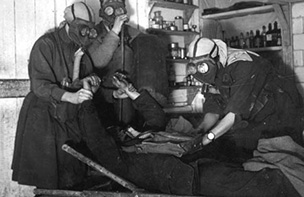Caring for the wounded
Mairi Chisholm and her friend Elsie soon became familiar with the horrific injuries sustained by the soldiers at the Front.
With no antibiotics and little proper medical equipment, the nurses had to deal with the aftermath of enemy attacks. Instant decisions had to be taken about who could be saved.
In her 1976 interview, Mairi Chisholm vividly described the horror of their world:
'If people were hit by shrapnel, the chances were that they got gas gangrene and went out on superficial wounds … The only thing we really had was iodine in those days which we poured into everything …
'There was one boy, very, very badly hit on the head and the brain was emerging. The brain was damaged to the extent that it would never be right, and there were masses of wounded coming in and they were most important because a lot of them were salvable … And do you know what we did? We just opened everything up and let the brain drop into a bucket …'
— Extract quoted by permission of the Imperial War Museum.

